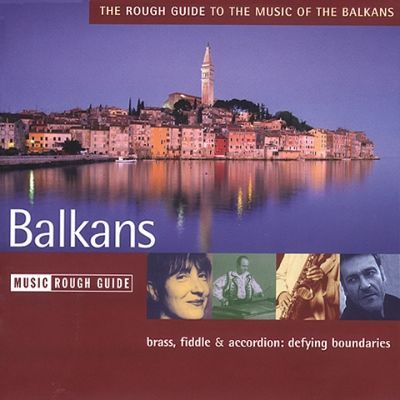Having listened to The Rough Guide to the Music of the Balkans from World Music Network a couple times, I couldn't help but feel that I hadn't even heard the tip of the iceberg. From the crooning of Serbia’s Šaban Bajramović, which begins the album, to the passionate polyphony of Albania’s Ensemble Tirana’s voices that ends it, there is a wonderful diversity of sounds that sometimes embraces tradition alone and, often times, embraces both tradition and more modern (and Western) influences. With hundreds of years of musical heritage and countless individuals appropriating newer influences, the term “rough guide” is probably too narrow. Still, one must start somewhere.
As mentioned above, Šaban Bajramović leads things off with his deep voice on “Djeli Mara” and is joined by Mostar Sevdah Reunion who contribute a track of their own later in the set. It’s a bouncy little tune with the drummer using brushes and features some sprightly trumpet playing. The listener is then transported to Croatia for “Pet Je Kumi” by Cinkuši. They are described as “The Croatian Pogues” and their contribution may start slow but it quickly picks up and the comparison to The Pogues makes sense. (Whether or not their lead vocalist is a drunk a la Shane McGowan is not addressed in the liner notes.)
Gypsy brass bands are represented here as well by Fanfare Ciocărlia and Maleshevski Melos from Romania and Macedonia, respectively. Both of their songs are upbeat and made me want to, in Phil Collins’ words, wiggle my bum. These were also the songs I would like most to see live. There’s just something about being in close proximity to thumping drums and a wall of trumpets, saxophones, and tuba that is desirable in the most ineffable way.
Other highlights are the infectious “Chaje Shukarije” by Esma Redzepova, the nimble cimbalom (an instrument a bit like a harp on its side playing with mallets but having dampers operated by pedal like a piano) playing of Toni Iordache, and the fantastic choruses of the women of Angelite. And let’s not overlook the ethereal melodies of Marušić is Trio or the polyphonic vocals of Ensemble Tirana of Albania or, well, you get the picture.
The song which really got under my skin on first listen was the albums penultimate track, “Trigona” by Kristi Stassinopoulou who hails from Greece. It features a dirge-like beat with a meandering violin weaving in and out of it. The best way to describe the music is to imagine Peter Gabriel’s “Growing Up” (from his Up album) done acoustically. The song is haunting and Stassinopoulou’s voice is this wonderful droning quality that is perfect for the hypnotic music.
Although the liner notes do a great job of giving a brief overview of Balkan folk music and the musicians contributing, I am left with two complaints: 1) not every musician and the instrument he/she played is listed and 2) the lyrics to the vocal pieces are missing. I would have like to have had the lyrics in their original language as well as rough translations. I was especially frustrated that the album’s final song was without lyrics. The Ensemble Tirana’s “Do Marë Ciften,” describes the adventures of a boy who goes into the woods hunting with rifle in hand. There he meets two beautiful women and…I have no idea what happens after that. Bummer.
So if you’re not already an expert in Balkan folk music and are curious where bands like Madison's Reptile Palace Orchestra receive inspiration or are just keen on an aural adventure, then add this CD to your collection.
(This was originally published at The Green Man Review back in 2003-04.)

No comments:
Post a Comment